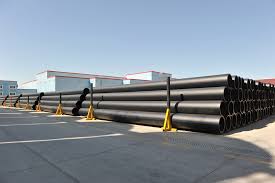Aug . 12, 2024 20:02 Back to list
Understanding the Applications and Benefits of PPR Pipes in Various Product Manufacturing
Understanding the Use of PPR Pipes in Modern Products
Polypropylene Random Copolymer (PPR) pipes have gained significant traction in various industries due to their exceptional properties and wide range of applications. This type of piping, known for its durability, resistance to temperature and pressure, and chemical inertness, has become a popular choice in both residential and commercial settings. This article will delve into the advantages of PPR pipes and their applications in different products.
Properties of PPR Pipes
PPR pipes, composed of a copolymer of polypropylene, are favored for their lightweight nature and high tensile strength. These pipes can withstand a temperature range from -20°C to 95°C, making them suitable for hot and cold water systems. Additionally, PPR pipes are known for their resistance to scaling and corrosion, which is essential for maintaining water quality and prolonging the lifespan of plumbing systems.
Another critical property of PPR pipes is their low thermal conductivity. This characteristic is particularly advantageous for hot water applications, as it minimizes heat loss. Moreover, PPR is a non-toxic material, compliant with health regulations, making it suitable for potable water systems.
Applications of PPR Pipes
1. Plumbing Systems PPR pipes are widely used in plumbing installations for both domestic and commercial buildings. Their reliability and ability to handle high pressures without cracking make them ideal for water supply systems. Additionally, PPR’s resistance to corrosion ensures that the water supply remains uncontaminated, which is critical for health and safety.
ppr pipe used for products

2. Heating Systems PPR pipes are often used in underfloor heating systems due to their excellent thermal insulation properties. They efficiently transfer heat while minimizing energy loss, contributing to energy savings in heating applications. Furthermore, the flexibility and ease of installation of PPR pipes allow for intricate designs in heating layouts.
3. Industrial Applications In the industrial sector, PPR pipes find applications in the transportation of chemicals and fluids. Their resistance to a broad range of chemicals makes them a safe choice for transferring corrosive substances. Industries such as pharmaceuticals, food processing, and chemical manufacturing benefit from the reliability of PPR piping systems.
4. Agricultural Use PPR pipes are also extensively used in irrigation systems. Their resistance to UV rays and ability to withstand varying environmental conditions make them suitable for outdoor applications. The lightweight nature of PPR pipes enables easy handling and installation in agricultural settings, improving efficiency in irrigation practices.
5. Fire Protection Systems The fire protection industry utilizes PPR pipes for their ability to withstand high temperatures and pressures. Their reliability and durability make them suitable for fire sprinkler systems, ensuring safety in residential and commercial properties.
Conclusion
The versatility and durability of PPR pipes have made them an essential component in modern plumbing and industrial systems. Their applications span across various sectors, contributing to improved efficiency, safety, and reliability. As industries continue to seek sustainable and efficient solutions, PPR piping systems are likely to remain a popular choice for years to come. The increasing awareness of the benefits of PPR pipes will drive their adoption in innovative applications, further solidifying their role in shaping the future of product design and infrastructure development.
-
High-Quality PVC Borehole Pipes Durable & Versatile Pipe Solutions
NewsJul.08,2025
-
High-Quality PVC Perforated Pipes for Efficient Drainage Leading Manufacturers & Factories
NewsJul.08,2025
-
High-Quality PVC Borehole Pipes Durable Pipe Solutions by Leading Manufacturer
NewsJul.08,2025
-
High-Quality PVC Borehole Pipes Reliable PVC Pipe Manufacturer Solutions
NewsJul.07,2025
-
High-Quality UPVC Drain Pipes Durable HDPE & Drain Pipe Solutions
NewsJul.07,2025
-
High-Quality Conduit Pipes & HDPE Conduit Fittings Manufacturer Reliable Factory Supply
NewsJul.06,2025

